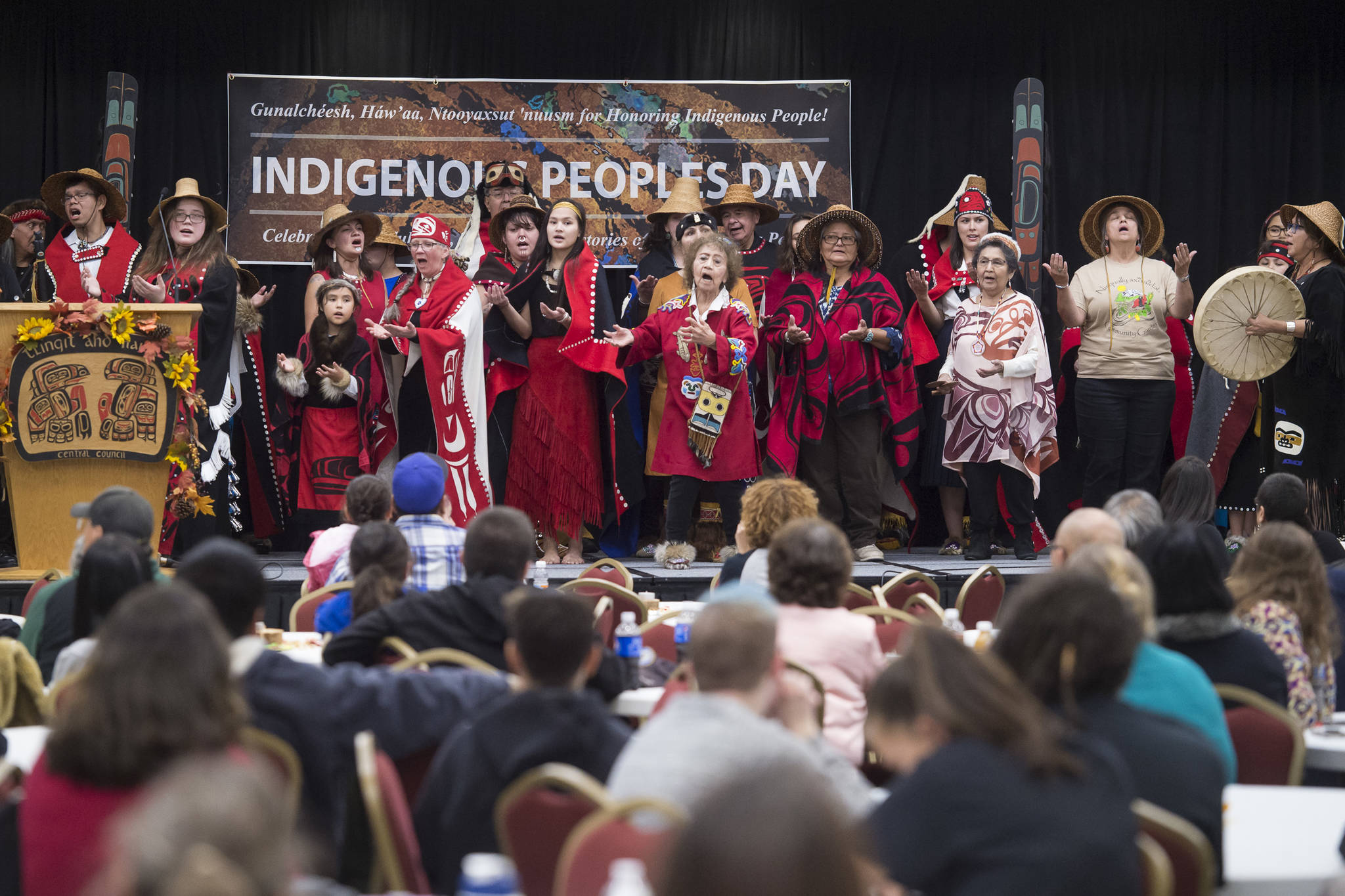Correction: An earlier version of this article made a reference to dance leader Nancy Barnes’ mother when it should have been referring to her grandmother. This article has been changed.
Even as the son of a Tlingit icon, Walter Soboleff Jr. felt invisible at times as a teenager.
As he performed in the dance group Yees Ku Oo at Monday’s Indigenous Peoples Day Celebration, Soboleff Jr. was far from invisible, as he announced the group’s entrance by loudly declaring, “Cast your eyes this way” in both Tlingit and English.
Having this day officially recognized by the state for the past two years, he and others said Monday, has shined a light on Alaska Native cultures and languages.
“Just by having an event like this, it’s heartwarming,” Soboleff Jr. said. “Just to say, ‘Hey, these people are here too.’”
Prior to Monday’s celebration at Elizabeth Peratrovich Hall in Juneau, Soboleff said that he still doesn’t know as much of the Tlingit language as he would like to. He’s not alone, as the numbers of fluent Alaska Native speakers are dwindling.
During the Alaska Legislature’s most recent session, lawmakers passed a resolution declaring a linguistic emergency for Alaska Native languages, and Gov. Bill Walker signed an administrative order in September to officially declare the state of emergency. European and American governments worked for centuries to suppress Alaska Native languages and prevent children from speaking them in schools.
Heather Gatti, who is the special assistant to Central Council of Tlingit and Haida Indian Tribes of Alaska President Richard (Chalyee Éesh) Peterson, said the state’s declaration had a two-fold effect.
“While it’s exciting to get that recognition that it’s an emergency, it’s still the realization that they’re in emergency,” Gatti said. “We can all be doing our part. Learning how to say ‘hello’ and ‘thank you’ in the language is still a way to make sure it’s surviving.”
Those everyday phrases were key to Monday’s celebration, as language leaders took the stage and spoke to the large crowd in Tlingit, Haida and the Tsimshian language Sm’algyax. CCTHITA organized the event, along with the Sealaska Corporation and Southeast Alaska Regional Health Consortium (SEARHC). A few of the speakers introduced themselves in multiple languages.
Nancy Barnes, the leader of Yees Ku Oo, said her grandmother was fluent in the Tsimshian language Sm’algyax, but that she was punished for speaking it publicly. As a result, Barnes said, her grandmother didn’t teach her children much of the language to spare them from similar punishment.
Now, Barnes and her niece (also named Nancy Barnes) attend a Sm’algyax language learners’ group every Saturday in an effort to discover the language and reclaim a key piece of their culture.
“I didn’t understand that the languages were in a state of emergency,” the younger Barnes, 19, said. “Now that I get to experience everybody trying to learn and speak their language, it’s really important and it’s really empowering. When you see other people who know more of the language than you, it just makes me strive to want to know more.”
A report from the Alaska Native Language Preservation and Advisory Council this year stated that unless there are “well-planned, well-implemented policy changes” in the state, many Native languages will be extinct or dormant by the end of the 21st century.
While there are concerns about the survival of these languages, Monday’s event was still very much a celebration. The event hall was packed with people from all corners of the community.
It’s #IndigenousPeoplesDay in #Juneau, and the Yees Ku Oo dancers are bringing people to their feet at the @ccthita-organized celebration. pic.twitter.com/QssdWpxYrf
— Juneau Empire (@JuneauEmpire) October 9, 2018
Tribal citizens Lyle James and Stephanie Masterman were the two keynote speakers at the event. James, who goes by his Tlingit name Xeetli.éesh, lives in Juneau and is one of the leaders of the Woosh.ji.een dance group.
Masterman, whose Tlingit name is Saał’gín, lives in Seattle but is originally from Hoonah. She was recently elected as an Emerging Leader and is an artist, student and youth ambassador for the Seattle Tlingit & Haida Community Council.
The older Barnes pointed out that there were many tribal citizens in the audience Monday, but people from all over the community were there.
“I think it’s good to recognize all cultures and all our differences,” Barnes said. “It just makes us richer and better.”
• Contact reporter Alex McCarthy at 523-2271 or amccarthy@juneauempire.com. Follow him on Twitter at @akmccarthy.

